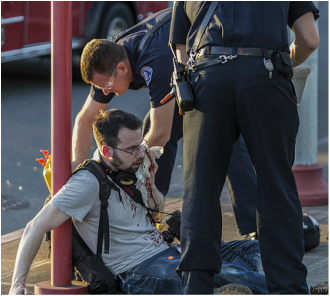
What do they know that you don't? When people are that "jacked" up on adrenaline, they literally cannot hear. "Put your hands on the hood, sir. Put your hands on the hood, sir". That's it and they keep repeating this until they achieve compliance. Cops know that nothing is going to be resolved then and there. Let the courts work it out. Their job is public safety. That's it. It should be your job, too. Why?
1. Intervene and resolve all of the skirmishes.
2. Use the same strategies against them that they are using against each other (screaming, posturing).
3. Fixing everything in their lives for them.
Your job is to:
1. Keep them from physically harming themselves and each other.
2. Model and guide healthy problem-solving.
3. Making it clear to them which behaviors are acceptable and which behaviors are not acceptable.
4. Implement swift and meaningful consequences for violating the family rules.
5. Make sure they know what the family rules are (respect, cooperation, consideration, no physical violence).
6. Reduce the overall level of tension in the family.

I recommend that the family rules be posted in large letters so that kids see your commitment. List the top 3. Not too many words. Be brief. Put each one in a different color.
Make strong statements about the culture of the family. "The Jones family cares about each other. We do not hit each other." This language does not identify any one person's conduct, but rather reinforces the "will of the tribe".
1. Step away from the drama. Do not even try to compete with their level of emotional intensity. Not going to teach them anything. Is exhausting and increases anxiety and tension.
- They're fighting again. Step up close to them. Keep stepping close to them until they acknowledge your presence. When they start to pay attention to you instead of each other, make a neutral statement. Use non-inflammatory language. "Make a choice. Resolve this or I'm taking action on your behalf."
- You don't necessarily have to deal with this conflict at the moment except for safety. Separate them. Deal with each one by one and then together later when tempers are calm ("Keep your hands on the hood, sir".) When you meet with them, make it fast and reinforce the family rules. You might not want to do anything at all until they ask you for something at which point you say, "You and Joey were fighting this morning and now, I have no energy to drive you to your friend's house. Maybe the next time you start fighting with him, you'll remember that it stresses me and then, I don't want to go out of my way to do nice things for you." BOOM!
- Know that skirmishing is an opportunity to develop social skills. You don't have to intervene with every raised voice. Take a clue from the lionesses on the African savannas. Their mothers tolerate their nonsense until she's had enough and she swipes them with her massive paws. Then, you see little lions rolling across the ground. They stand up, shake their heads and gather themselves. End of it.
And no, don't hit your kids, substitute a wallop with effective strategies.
2. Stop their forward motion. Kids, as well as the rest of us, like to keep moving forward. When we are stopped, we get frustrated.
- They will argue in the car. Be willing to be late. Be willing to be embarrassed when you arrive. Tell the truth. "I apologize for being late. My kids were fighting in the car and it was not safe to drive." Then, watch their faces. Oops! Busted!! If they start arguing and it becomes disruptive, turn on the signal and pull over in a safe area. When they finally become aware that you've stopped, readjust the rear- view mirror and tell them calmly, "It's not safe for me to drive when you're fighting. Make a decision. We can sit here and argue or we can get underway." If they start up again, repeat. If you are consistent, they won't argue in the car anymore because you will not reward their behavior. You may also want to leave a bit earlier to anticipate these "stops".
- Be prepared to leave. If your kids fight when they are out in public, be prepared to leave. Take the food to go. Leave your goods and come back later. Get up in the middle of the movie, leave the party. Your threats have to have teeth, otherwise, you teach them that your words mean nothing and that lesson could get them hurt. If both adults can take two cars and one kid falls apart, the food can be packed up and they can eat it in their room. Or they can have a PB and J with some milk.
Just do the best you can. TTFN, Claudia



